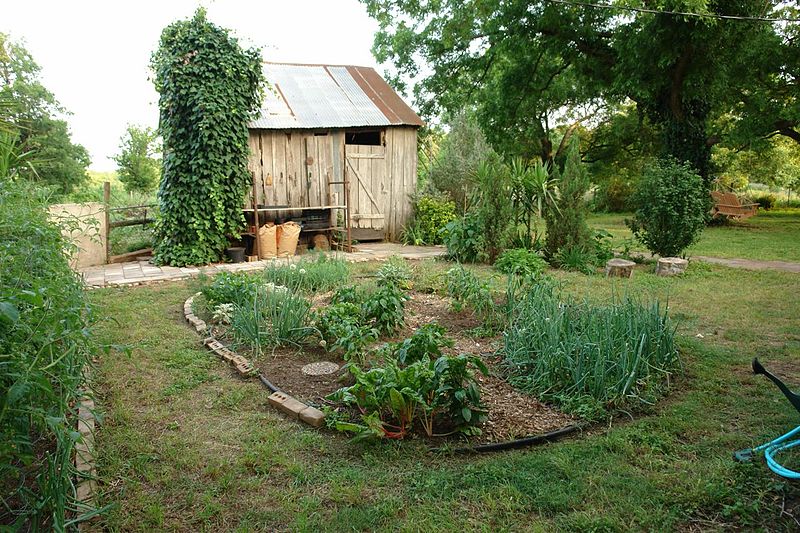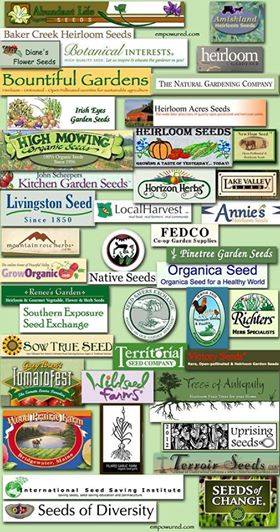Table of Contents[Hide][Show]

Seed catalogs for the upcoming growing season are arriving in mailboxes across the Northern Hemisphere with home growers everywhere starting to plan which seeds they will sow in freshly composted garden. A positive trend in recent years is the growing number of gardening enthusiasts choosing to plant gardens using organic and/or heirloom seeds.
What most of these home gardeners don’t realize is that corporate behemoth and GMO titan Monsanto has been gobbling up the seed market faster than a caterpillar can munch a tomato plant! With one fell swoop in 2005, Monsanto grabbed approximately 40% of the US vegetable seed market with its acquisition of Seminis.
This means that a home gardener could unknowingly be supporting the development and proliferation of genetically modified crops if the seeds used are from Seminis. In addition, Monsanto now apparently owns the trademark for many of the names of the heirloom seed varieties themselves!
Planting a sustainable home garden is much more than just choosing certified organic seeds and seedlings, eschewing pesticides/herbicides and using organic compost. This is because Monsanto has cleverly positioned itself to make money off the home gardening trend.
Does this mean that even if you buy organic or heirloom seeds from a completely independent company some of your purchase might be supporting the bad guys?
Yes, it does.
Surprise!
Home gardeners would do well to bone up on where to purchase their seeds so they aren’t inadvertently doing business with companies that maintain a working relationship with Monsanto-Seminis or were acquired by them.
Buying Organic or Heirloom Seeds Without Supporting Monsanto
Here are the recommended steps for the 2014 growing season for those who want to truly strike a blow for sustainability in every way with their home gardens:

Avoid buying from the seed companies affiliated with Monsanto. Here’s a list of these seed companies by location (enter you zipcode for a list of dealers to avoid).
- Buy from companies Monsanto HASN’T bought and are not affiliated or do business with Seminis: The graphic above indicates numerous companies that are worthy of your patronage as compiled by the International Seed Saving Institute. Please note that this many not be a complete list. If your seed company does not appear, just be sure to clarify with the owner about any potential affiliation with Monsanto-Seminis before buying from them.
- Avoid buying heirloom varieties for which Monsanto owns the trademark.
- Ask seed companies if they have taken the Safe Seed Pledge. Here’s a list of companies that have taken the Safe Seed Pledge and believe in responsible plant genetics. These are good companies to buy from.
Background on Monsanto’s Quest for World Seed Domination
Monsanto’s corporate quest is clearly to make money on each and every one of us whether we choose to eat supermarket frankenfoods produced with abominable, patented GM crops or carefully plant and tend an organic garden at home. Here’s some background information on the subject you may find interesting as well as enlightening:
If you are a home gardener and have information to contribute regarding these steps, please add to the discussion in the comments section. Also, please spread the word via gardening forums you may participate in that folks need to be very careful when seed sourcing for their spring gardens this year else they might be unknowingly supporting Monsanto.
Let’s make this the year when Monsanto’s grip on the worldwide seed market loosens and the movement to seed sustainability gains momentum!
Update
The day after this article was originally published in 2013, the CEO of a large GMO soybean seed company in the Midwest emailed me complaining that the article was short-sighted and insisting that Monsanto is helping feed the starving people of the world. He even went so far as to say that GMO crops are “proven safe”. Click here for the text of this CEO’s entire email plus my written reply.
I have also received email complaints from two other seed companies, one in Canada and one in Arkansas, that do business with Monsanto-Seminis and were offended by what they viewed as inaccuracies in the post. In response, I have adjusted the text slightly and moved linked sources to within the text rather than only listed at the end to make the message of the post as clear and precise as possible so as to not result in any consumer confusion over the information.
I have received no complaints about this article from seed companies completely independent of any affiliation or ties to Monsanto-Seminis.
More Information
Why I Avoid Organic Hydroponic Produce
The Hydroponic Invasion of USDA Organic
Heirloom vs Hybrid Produce
Photography Credit








owned by Mars which is a pro-GMO company. Don’t buy Seeds of Change seeds if you don’t want to support the bad guys.
Thank you for your wonderful research. We are a small nursery selling classic plants that are not patented. It’s getting harder and harder to find them.
Hi there, Thank you for your wonderful research. We are a small nursery selling classic plants that are not patented. It’s getting harder and harder to find them. Each year the fruit tree nurseries and plant wholesalers are increasingly moving toward patented plants. I cannot figure out who really owns Proven Winners, but if you read their contract it sounds exactly like Monsanto. You cannot propagate, we have the right to come on your property and check to see if you are using liners off our plants, we will take legal action, you cannot retaliate. Their contract supercedes all other contracts. How do I find out who owns Proven Winners? Nurseries are up against the wall now bc patented plants are expensive, you have to use their tags, their pots, and cannot reuse the labels for patents ever.
The image above shows Seeds of Change among the “good” companies. Seeds of Change was purchased by the Mars Corporation which has invested thousands of dollares toward fighting GMO labeling of foods. DO NOT BUY FROM SEEDS of CHANGE please!
If you’re looking for an anti-Monsanto, non-GMO, HEIRLOOM vegetable and herb seeds company. Look no further than UrbanGardenSeeds.com 🙂
Great article except for the fact the Seeds of Change is owned by Mars which is a pro-GMO company. Don’t buy Seeds of Change seeds if you don’t want to support the bad guys.
How in the world did we ever allow a corporation to “own” a seed?!? I get that they own a complex freak of nature frankenseed that they developed in a lab, but heirlooms too? Weren’t these around far before the seed companies?
Please someone help me understand this: on a website of a seed company i read the following “Vesey’s Seeds Ltd. does not knowingly buy or sell genetically engineered or modified seeds or plants. Vesey’s has also signed the safe seed pledge and we continue to encourage healthy gardening practices for all of our customers.” Then below that “In the event that an organic product is not available, we will substitute with untreated seed of a similar variety, unless you specify that you do not want any substitutions.”
So when I read the article, and saw that one of the four ways to keep Montsanto out of a garden was to buy from a company that has taken the “Safe Seed Pledge”, is that in itself now adequate?
Great article except for the fact the Seeds of Change is owned by Mars which is a pro-GMO company. Don’t buy Seeds of Change seeds if you don’t want to support the bad guys.
If you want to know more about Monsanto, do your homework and take some time watch these videos:
How it started…
youtu.be/eUd9rRSLY4A
Who they are…
youtu.be/mVgwqpvI1bg
What they are doing…
Search Monsanto and the honey bee colapse (Colony Collapse Disorder). Just search Monsanto and their history to get a real understanding of who they are. It doesn’t take a rocket scientist, just a little common sense. You might find it interesting, or likely disturbing, at what you find.